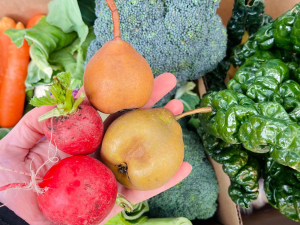'Wonky Flowers' to cut waste, support growers
To assist the flower industry in reducing waste and drive up demand, Wonky Box has partnered with Burwood to create Wonky Flowers.
 Beyond blaming supermarkets, there are simple choices we can make as shoppers that can take some of the sting out of rising costs.
Beyond blaming supermarkets, there are simple choices we can make as shoppers that can take some of the sting out of rising costs.
OPINION:It’s a tough time for Kiwi households.
Stats NZ figures show food prices are up around 7% year-on-year, with fresh fruit and vegetables some of the hardest hit. Tomatoes, cucumbers, and lettuce have spiked in recent months, while staples like potatoes and onions have also seen sharp increases. All of this is landing on top of wider day-to-day costs that continue to climb.
There’s also ongoing discussion about bringing more competition to the supermarket sector – something we at Wonky Box would welcome – but meaningful change won’t happen overnight. In the meantime, families are still facing hard choices every time they shop and hit the checkout.
Beyond blaming supermarkets, there are simple choices we can make as shoppers that can take some of the sting out of rising costs. The truth is, some of the power to ease costs isn’t locked in boardrooms – it’s in our own shopping baskets. Those choices don’t always make headlines, but they can make a difference to household budgets.
A generation ago, we ate with the seasons. We knew strawberries belonged to summer, mandarins were a winter treat, and asparagus was a short-lived spring special.
Today, we expect strawberries in June and avocados in May, and when the price hits home, we point to supermarkets as the culprit. While some of those concerns are valid, part of the challenge lies in our own shopping habits.
Seasonal produce is not only fresher and better tasting, it’s also more abundant, which makes it more affordable. By contrast, out-of-season items are scarce, imported, or grown under costly conditions and we all pay for that at the checkout.
Shopping with the seasons takes the guesswork out of what’s affordable. When produce is abundant, it’s fresher, better tasting and cheaper - a win for both households and growers. Models like Wonky Box are one example of how this can be made easier, by curating boxes around what’s plentiful right now and reducing food waste in the process.
Flexibility is another part of the puzzle. When markets are flooded with surplus crops and prices fall, those products should be flowing more readily to consumers.
When supply tightens, adjustments need to be made to keep prices fair for shoppers and sustainable for growers. That balance is vital - it gives growers security, households predictability in their weekly spend, and helps the food system stay resilient.
With spring now here, supply will start to balance out. Indoor crops like cucumbers are improving, and the seasonal headline act – asparagus – is starting to arrive now.
Thanks to its geographic spread across Hawke’s Bay, Waikato, Manawatū, Levin and Canterbury, asparagus offers a resilient supply chain that helps protect consumers from localised frosts.
Of course, early volumes will come with a premium, but as supply builds, prices will ease - and it’s also when bent-stem bunches and other imperfect produce start appearing in boxes. A reminder that food doesn’t have to look perfect to taste great, or to deliver value.
If we want a more affordable and sustainable grocery market, the answer isn’t just waiting for another big-box player to arrive. It’s rethinking how we shop – embracing seasonality, being flexible, and recognising that smarter choices can deliver better outcomes.
Angus Simms is the co-founder of Wonky Box
Keratin biomaterials company Keraplast and Wools of New Zealand have signed a new superpremium wool contract which is said to deliver a boost to wool growers.
While things are looking positive for the red meat sector in 2026, volatility in global trade remains a concern, says the Meat Industry Association (MIA).
The quest to find innovative practical, scientific solutions to deal with water-related issues at a catchment level has been the theme of an important conference at Massey University last week.
One of the country's top Māori farms faces a long and costly rebuild to get the property back to where it was before recent storms ripped through it.
The latest Global Dairy Trade auction results have delivered a boost to dairy farmers.
New Zealand potato growers are prioritising value creation from high yields to meet a complex mix of challenges and opportunities, says Potatoes NZ chief executive Kate Trufitt.